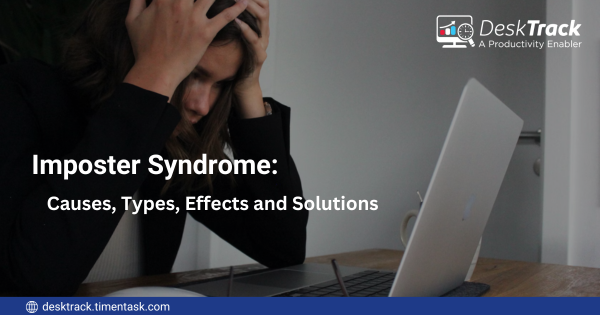
Do you ever think that all your friends have better jobs and you, with better skills and experience, are still struggling with job security? Does being perfect all the time trouble you? Feeling imposter syndrome at work?
All these emotions are because of imposter syndrome.
Don’t know what imposter syndrome is? How does it affect you? Why does it occur? How to treat it?
This blog will answer all such doubts. Here we will help you understand imposter syndrome in depth and find ways to prevent it.
What is Imposter Syndrome?
When an individual has feelings of self-doubt due to work accomplishments or starts wondering that they don’t deserve their current jobs or success, they are having imposter syndrome. This syndrome is also known by different names such as imposter phenomenon or imposter experience.
It is a cognitive disorder that includes feelings of self-doubt, personal incompetence, or lack of confidence. This results in feelings of fraud, self doubts about one’s abilities. Anyone can feel this syndrome irrespective of gender, role, or background.
According to Carolyn Herfurth, co-founder of the Imposter Syndrome Institute, it is not a diagnosable disorder. He defined impostorism as people believing that they are not talented, capable, intelligent, or qualified enough like others. The strange thing is that these feelings are despite all accomplishments.
History of Imposter Syndrome
The first persons to describe it were Pauline Clance and Suzanne Imes in the late 70s in their study, “The Imposter Phenomenon in High Achieving Women: Dynamics and Therapeutic Intervention.”
During the research, the authors found that 150 highly successful women holding PhD in different specialties were respected professionals in their fields. However, they were not happy internally and felt like imposters.
Researchers found this phenomenon more prevalent in a selected sample of high-achieving women. They defined imposter syndrome as a phenomenon to designates an individual’s internal experience of intellectual phonies.
Apart from feelings of fraud, imposter syndrome is also related to feelings of inadequacy. Dr. Gena Cox, an organizational psychologist, there are two components of impostorism:
- The feelings of inadequacy that are due to an individual’s psychological makeup.
- The inadequacy develops from a response to environmental factors.
The psychologist has also described that at the workplace, the external factors are more effective because of power and influence dynamics.
Generally, it comes with other feelings like insecurity, inadequacy, self-doubt, depression, and other similar feelings. Before knowing the ways to combat imposter syndrome, it is essential to understand the different types and causes of this syndrome.
Different Types of Imposter Syndrome
There are five different types of Imposter Syndrome. Let us discuss each in detail so that you can decide which type of imposter you are:
The Perfectionist
People with this type of imposter syndrome generally focus on how things are done. Committing even a minor mistake is a sin for them despite impeccable performance. Such people feel failure and shame even when at minor faults. Perfectionists have high standards. Even after achieving great things they desire to perform better.
The Expert
Experts tend to know everything and when they miss something or do something wrong, they experience failure and shame.
The Natural Genius
Natural geniuses are concerned about how and when they accomplish their goals. They generally believe that finishing a task quickly signals competence.
To achieve competence, they struggle to polish their skills. If they fail to do so they consider it a failure which further causes shame.
The Soloist
The main concern for people with this type is who is the task performer. They want to do everything on their own and feel ashamed to ask for help, tutoring, or coaching. It is the most common type of imposter syndrome.
The Superhuman
Superhumans are concerned about playing multiple roles and being successful in every role. They want to be a perfect parent, partner, friend, employee volunteer, etc. but, when they fail in any role, they feel ashamed.
Red Signals: Imposter Syndrome Symptoms
Below listed are the common signs of Imposter Syndrome. So if you have these red signals you need to worry.
- If you are working more than what is normally expected.
- When you start blaming and criticizing others for your failures.
- If you start feeling that others are cheating on you.
- Unnecessary comparisons with others.
- Unacceptance of genuine praises from others.
- Feelings of awkwardness in asking for help or support from others.
Prominent Causes of Imposter Syndrome
Having discussed the types and symptoms of impostorism, let us now talk about the major causes of this syndrome in depth:
Family Environment
People tend to behave the way their families expect from them. For instance, how a family reacts to a child’s report card and what they expect from them in the future affects them and plays a great role in inducing such feelings of insecurity in them.
Depression
People with depression often feel unworthy and have low self-esteem, finding it hard to be satisfied in their lives and achievements. Depression adds more to their inadequacy and self-doubt, the prominent cause of imposter syndrome symptoms.
Comparison with Others
When people start comparing themselves with others who are in better positions, they start feeling degraded. They develop feelings as if their current positions are not good enough and they start to stress about being in better places.
Personality Trait
People might be perfectionists; traits in their personalities are more susceptible to impostorism.
Society Pressure
Pressure from society results in insecurity in individuals. When measuring their worth on societal grounds they start feeling not successful enough or not deserving of what they have.
Increased Pressure
People with increased workloads feel pressure and tend to feel anxious about successful completion. When unable to do so, they feel ashamed and fail. With employee time tracking software like DeskTrack, employers can keep employees away from increased work loads.
Lack of Diversity
The culture of inclusivity is also crucial in influencing imposter syndrome. When people do get a sense of belongingness, they become insecure. This lack of diversity also includes gender gaps as well. For instance, if you are the youngest in your organization, you feel like an under-performer.
Confidence Gender Gap
The confidence gap between men and women also induces insecurity. It is generally observed that women are least confident during their 20s and 30s in comparison with men of the same age. However, during their 40s, and 50s women feel more confident than men of the same age.
New Responsibilities
Getting new responsibilities can also cause Imposter Syndrome as new roles come in handy with new transitions which might put pressure on people. People might feel that they are not deserving of these roles and cannot perform well and do justice to the provided roles.
Role of Bias
When employers start being biased toward their employees, this can contribute to feelings like an imposter. For instance, those who know about the bias in advance, tend to start working harder to disapprove of biasness.
Negative Self Talks
Individuals start to converse with themselves focussing on their weaknesses instead of their successes and put themselves down for no reason. These internal beliefs generally lead to feelings of low self-esteem and self-doubt. Although self-criticism is not unhealthy there must be a limitation to it.
Unrealistic Expectations
When people start building unrealistic expectations and set unrealistic goals for themselves, imposter syndrome is expected to stem. After setting such goals, when people are unable to complete them they start developing feelings of inadequacy and start comparing themselves with the successes of others.
How can Imposter Syndrome kill Productivity?
Different ways how it can hamper employee productivity at the workplace are:
Reduces Confidence
People with Imposter Syndrome feel less confident. This feeling prevents people from achieving more and taking on new challenges. This is because of feelings such as excessive self-criticism.
Increases Self Doubts
One of the other leading results of this syndrome is decreased productivity due to increased self-doubts. This leads to overthinking, devoting unnecessary time to worrying about tasks at hand, etc.
Promotes Fear of Failure
People with imposter syndrome also experience fear of failure which results in unwillingness to try anything new or take more responsibility, etc.
Increases Burnout
It also induces feelings of burnout. This is because when someone is constantly pushed to prove their worth, they feel exhausted and the least motivated. This reduces their productivity and work efficiency.
Exceeding Deadlines
When employers spend more than enough time on a particular task or project to achieve unrealistic perfection. This can add monetary expenses for the employer and affect their reputation in front of the clients.
Ways to Overcome Imposter Syndrome
After an in-depth discussion on imposter syndrome, its types, causes, and symptoms, let us now discuss a few crucial ways to overcome it. The useful methods are:
Overcome Negative Thoughts
When you start thinking about your achievements and self-criticize less, you can overcome imposter syndrome. Thinking positively about your achievements will be a great help.
Consider Positive Feedback
Try to recall the positive feedback you got previously from your employers, relatives, and parents.
Deploying Employee Monitoring Software at the Workplace
Today, employee monitoring software can help both employees and employers tackle work effectively. These software can help employers to deploy the right amount of work to their employees. This way employees can be free from concerns of missing deadlines, or failure and can be free from imposter syndrome.
Set Realistic Goals
Set goals as per your capacities and after seeing others. If you set realistic goals, you will have a high probability of accomplishing them and there will be less stress of failure.
Discuss the Problem with Others
Try to talk with your loved ones, and discuss your difficulties rather than keeping it to yourself. Maybe others can find solutions to your problems.
Conclusion
Imposter Syndrome can lead to multiple problems including serious mental health issues such as anxiety, stress, depression, and many related issues. Today’s workplaces with high competition induce this syndrome in individuals more than ever before. Knowing the syndrome, its causes, and solutions can help individuals improve their situations and lead a healthy and balanced lifestyle with more success.




